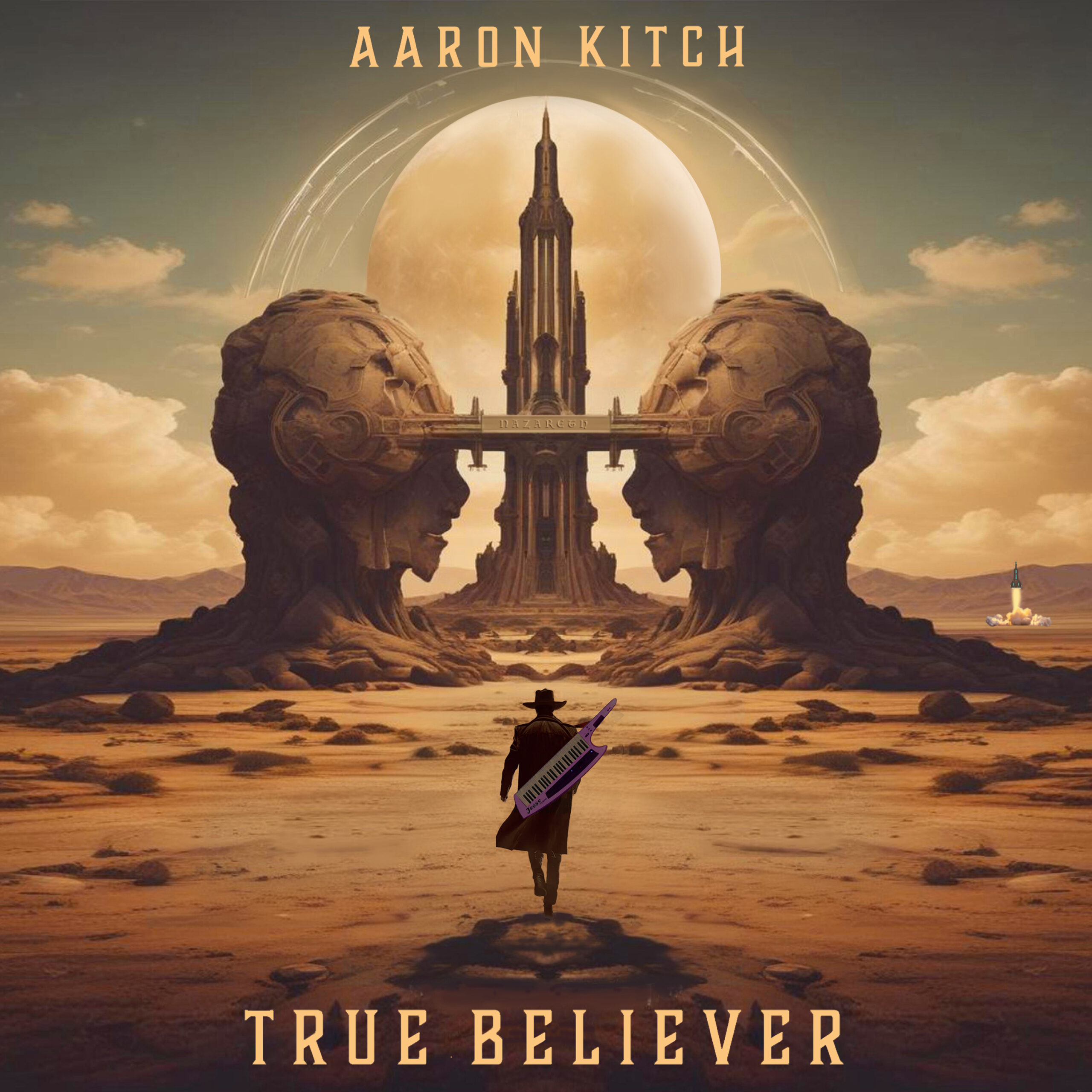Professor Aaron Kitch celebrates synth-pop album
October 17, 2025
 Courtesy of Aaron Kitch
Courtesy of Aaron KitchOn Wednesday, immersed in exploratory music and visuals in the Center for Experimental Multimedia Art, Bowdoin listeners found themselves in Nazareth, a fictional utopia set outside of Las Vegas in the 1980s and ’90s.
“True Believer,” a synth-pop concept album performed by Professor of English Aaron Kitch, explores the narratives of “soul seekers,” dreamers and exiles from conventional religion, with each song presenting a new perspective from the imaginary desert community.
Released in June 2025 after four years of songwriting, experimentation and painstaking mixing and remixing, “True Believer” represents Kitch’s longstanding commitment to the craft.
Kitch is an avid piano, keyboard and organ performer, while also a proud owner of one of the first commercial synthesizers, the Juno 106. He played in jazz and rock bands, pit orchestras, musicals and even a London bar before devoting himself to songwriting during the pandemic.
The stars aligned for “True Believer” when Kitch went on sabbatical and met Jud Caswell, an award-winning songwriter and owner of Frog Hollow Studio in Brunswick.
“I had demos for about 20 songs, and we put them in his computer and started mixing them and talking about them,” Kitch said. “As the album progressed, I found some themes emerging, and they coalesced around this utopian community called Nazareth.”
Kitch envisioned Nazareth having a devout “spiritual component,” a gathering place for those seeking religion and renewal without cultlike associations. The album’s synth-based soundscape mirrors this impassioned yearning through layered electronic sounds, reflecting the tension between faith, longing and futuristic realities.
Despite its meditative themes and thoughtful exploration of human relationships with divinity, the album was a creative refuge from Kitch’s professional work as a scholar of literature.
“I like that my songs are simple, conceptually and musically, because I spend a lot of my time dealing with complex and old texts, and my music is the exact opposite,” Kitch said.
Nonetheless, Kitch’s literary passion is subtly expressed throughout the album. The fourth track, “Darkly Bright,” reimagines the paradox presented in Shakespeare’s “Sonnet 43,” in which the speaker sees his beloved more vividly in dreams than in daylight.
Kitch was encouraged in August to host an album listening party in the multimedia center, but upon visiting the space, he realized visual accompaniment would be necessary.
“I wanted something with some narrative elements so it would visually intersect with the album, but it could also stand alone,” Kitch said. “I think the songs that describe circumstances or people’s emotions are pretty vivid, and others are more abstract.”
The album’s visual counterpart, a four-day film project, expanded it into a cinematic experience. The accompanying video is composed of black-and-white film snippets and vibrant imagery generated by artificial intelligence (AI), contrasting nature with the extraterrestrial and the past with dystopian futures.
Audience members at the listening event included several key collaborators, like Caswell.
“I’m an acoustic musician, but I grew up listening to music that sounds a lot like this,” Caswell said. “It was exciting to have a chance to experiment with sound through this genre, because when you’re working with keyboards and synthesizers, [Kitch’s] imagination was the limit.”
Although “True Believer” is a self-described synth-pop album, the multifaceted debut encompasses elements of blues, country, jazz, gospel and R&B.
“The keyboard has a bunch of sequencers, modulators and built-in sounds that gave me ideas,” Kitch said. “I built the sound around one particular patch in the synthesizer, so the album has electronic components, but it also has an authentic underlying piano, guitar and bass.”
Kitch enhanced his keyboard scores with Caswell’s live bass and guitar tracks, along with programmed percussion and AI software instrumentals.
He also collaborated with the Meddiebempsters, one of Bowdoin’s a capella groups, for gospel-reminiscent backing vocals. Orchestrated by Brendan Hill ’25, former leader of the Meddiebempsters, the group coordinated their own vocal arrangements and recorded in a Bowdoin practice room.
Kitch asserted that while he does not aspire to mass influence or perform on tour, he, much like the Nazareth community, is still seeking. Kitch hopes to release two more albums.
“As someone who makes music and records it, I simply want people to listen to it,” Kitch said. “I don’t expect them all to get it. I’m just honored that I was invited to share the music and video with the community, and we’ll see where it goes from there.”
Comments
Before submitting a comment, please review our comment policy. Some key points from the policy:
- No hate speech, profanity, disrespectful or threatening comments.
- No personal attacks on reporters.
- Comments must be under 200 words.
- You are strongly encouraged to use a real name or identifier ("Class of '92").
- Any comments made with an email address that does not belong to you will get removed.

Fantastic album and immersive event!
Given the topic, this was extremely well written. Bravo to the writer.